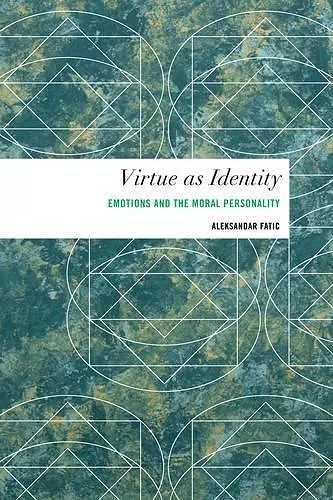Virtue as Identity
Emotions and the Moral Personality
Format:Paperback
Publisher:Rowman & Littlefield International
Published:11th Jul '16
Currently unavailable, and unfortunately no date known when it will be back
This paperback is available in another edition too:
- Hardback£127.00(9781783483037)

Virtue as Identity offers a study of how virtue is learned and identity acquired through the selection and internalization of values. A large part of this process is externally imposed through culture. Another, perhaps more important part of the process is the result of individual and collective sensibilities. The book emphasizes the role of emotions and emotional sensibility in our choice of values. The book re-affirms traditional morality as the foundation of our individual and collective identities. The author argues that emotions as well as rational decisions guide the value choices we make and the ideals of character that we presuppose on a political level as much as they do in our private lives. Thus the societies we live in are a reflection of our identities, or the identities of the majority. This opens up radical questions about the identities of the dissenting minorities, the proper concept of a moral or value-community, and the real reach and value of tolerance in modern democracy.
I find Fatić’s social and political critiques praiseworthy.... Many of Fatić’s suggestions for improvement are also apt and well-reasoned... Fatić’s social commentary is expert and refreshing. * Philosophical Practice *
This thoroughly argued and well written book will cause a lot of controversy because it challenges some basic notions of philosophy, psychology and even law, which assume a moral autonomy of the individual. Fatić deftly argues in favour of a society that cares about its members in a moral sense rather than just satisfies material interests. His logic also has some unexpected and disturbing consequences: If there is no moral autonomy of the individual, then western born jihadists confront the deficiencies of western societies whose lack of care has triggered such radical defections. -- Klaus Bachmann, Professor of Political Sciences at SWPS University of Social Sciences and Humanities, Poland
Aleksandar Fatic delivers a trenchant critique of post-liberalism's moral bankruptcy, and the depravities inculcated by its centrally-institutionalized values. He argues lucidly and passionately for the re-empowerment of local organic communities as antidotes to the monolithic turpitudes and dysfunctional policies of post-liberal statism. -- Lou Marinoff, Professor of Philosophy, The City College of New York
ISBN: 9781783483044
Dimensions: 229mm x 150mm x 20mm
Weight: 417g
278 pages